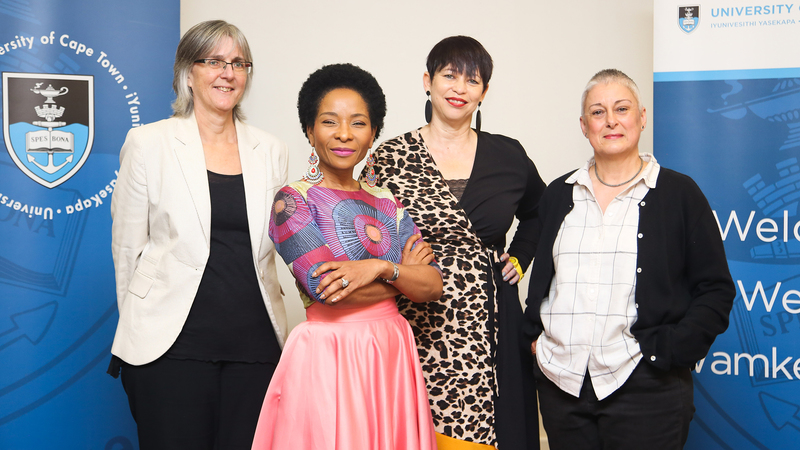All-women executive academic leadership for UCT
16 May 2019 | Story Supplied. Photo Je’nine May. Read time 3 min.The University of Cape Town (UCT) is celebrating its all-women executive academic leadership, rare in higher education institutions around the world, following the appointment of Professor Sue Harrison as the new Deputy Vice-Chancellor (DVC) for Research and Internationalisation.
Along with Vice-Chancellor Professor Mamokgethi Phakeng, Harrison joins Associate Professor Lis Lange (DVC for Teaching and Learning) and Professor Loretta Feris (DVC for Transformation) to complete the top levels of the university’s executive academic leadership structure.
Welcoming Harrison to the Leadership Lekgotla, Phakeng said the fact that all four executive leaders of UCT’s academic enterprise are female marks a significant moment of transformation for women in academia and leadership positions, in South Africa and globally.
“I am delighted that the UCT Council has placed their confidence in the experience and expertise of my executive colleagues,” she said.
Transformation for women
As at 2017 The Guardian reported that only a fifth of higher education institutions in the United Kingdom were headed by a female vice-chancellor, while the Times Higher Education World University Rankings revealed this year that just 34 of the top 200 institutions globally are currently led by a woman.
According to the American Council on Education’s American College President Study 2017, only 30% of that country’s college and university presidents are women – an increase of just four percentage points since 2011.
“The fact that all four executive leaders of UCT’s academic enterprise are female marks a significant moment of transformation for women in academia and leadership positions, in South Africa and globally.”
A long history at UCT
Harrison, who holds the South African Research Chairs Initiative (SARChI) Chair in Bioprocess Engineering and is director of both the Centre for Bioprocess Engineering Research (CeBER) and the Future Water research institute at UCT, takes over from Professor Kevin Naidoo.
Phakeng thanked Naidoo for his contribution since he began acting in the position at the beginning of the year.
Harrison has a long history at UCT, where she earned her BSc in chemistry and microbiology, and her honours in microbiology. She spent 28 years as an academic in the Chemical Engineering department, receiving her full professorship in 2000.
Eleven years later she was appointed as deputy dean of research and postgraduate studies in the Faculty of Engineering & the Built Environment, and focused on the establishment of interdisciplinary research entities at UCT, including the Future Water research institute, Phakeng said.
Harrison’s responsibilities as DVC will include improving research quality, quantity and impact, and ensuring that UCT maintains or improves its position as a research-intensive university “as reflected in the international ranking of institutions”.
 This work is licensed under a Creative Commons Attribution-NoDerivatives 4.0 International License.
This work is licensed under a Creative Commons Attribution-NoDerivatives 4.0 International License.
Please view the republishing articles page for more information.
Curriculum Change Framework feedback
The Curriculum Change Working Group (CCWG) was set up to facilitate dialogue across the university over a period of 18 months (March 2016 to September 2017) in order to shape strategies for meaningful curriculum change. The outcome of the process has led to the development of the Curriculum Change Framework, which highlights key pathways to meaningful curriculum change.
We hope that the framework will serve as an invitation for academic and research units at UCT to reflect on their own understanding of curriculum change, as well as on past, current and future practices of curriculum review, innovation and broader change within the academy.
Engaging with the Curriculum Change Framework is a fundamental step in an institutional dialogue about curriculum and the meanings and practices of curriculum change across disciplines.
To make the process inclusive and transparent, you are invited to send your comments on the framework to Anthea Metcalfe (Anthea.Metcalfe@uct.ac.za).
Please note that all comments or documents submitted will be loaded to this page and will be fully accessible to the public.









